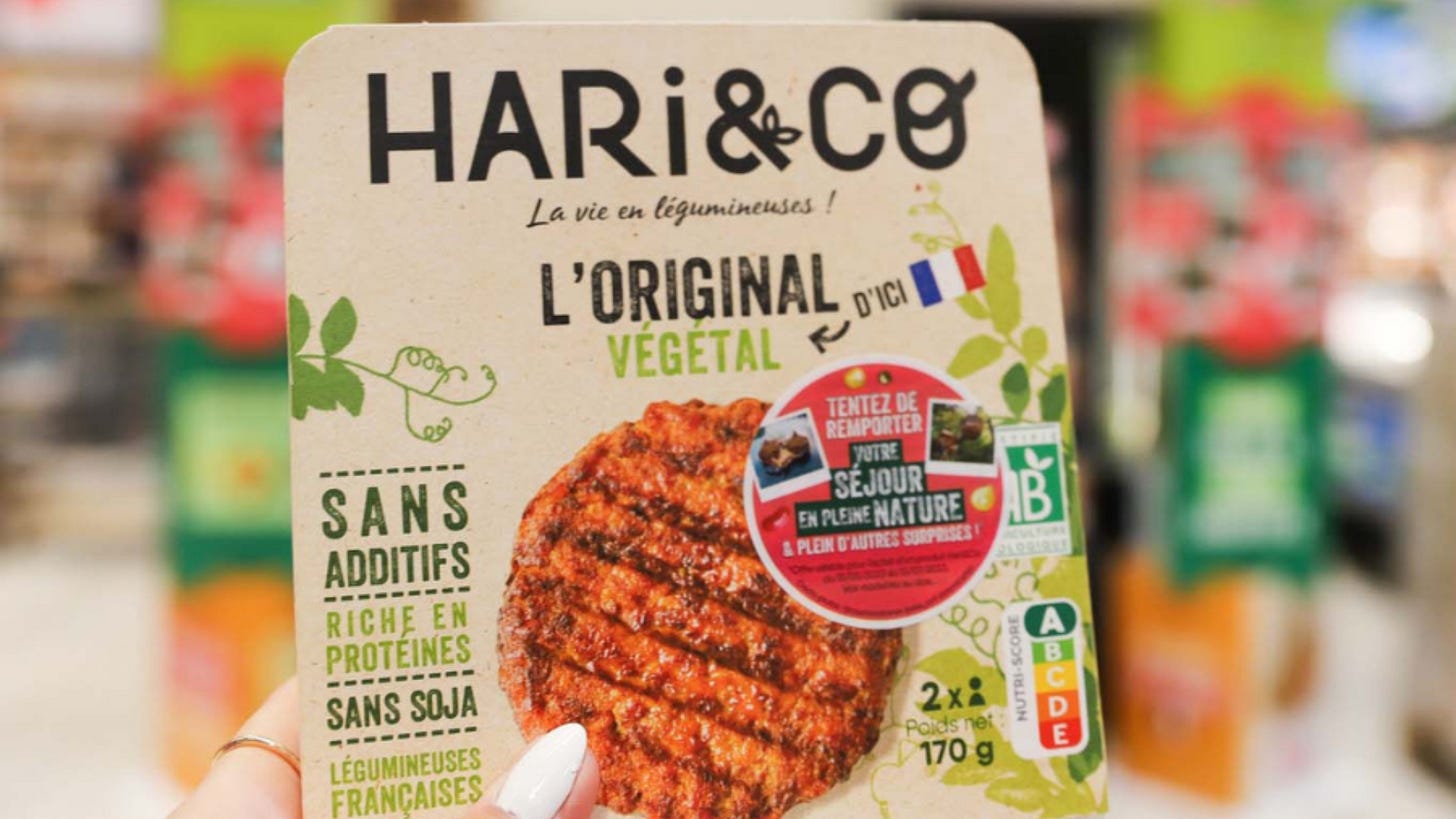Founders Vs Farmers: A French Tech Food Fight!
Bowing to the agricultural sector, the French government imposed new restrictions on labels used by alternative protein companies, who can no longer say "Veggie Bacon."
Almost one year ago, Bruno Le Maire, the nation’s Economy Minister, self-proclaimed gourmand, and writer of softcore porn, traveled east of Paris to the rural town of Chevilly to officially inaugurate a new factory built by a FoodTech startup called HappyVore.
The company had developed a process for using vegetables grown in France to create alternative proteins that could be used to make meat-free consumer products. This would be healthier and better for the environment because it had a much smaller carbon footprint than the traditional poultry and beef industries.
When the company raised €35 million in venture capital in 2022 from investors such as the state bank Bpifrance, the co-founders hailed the project as a major step toward transforming French agriculture and nutrition. They used the money to purchase an abandoned factory and renovate it, hinting at a renewal of the manufacturing sector in the countryside that the government has been trying to accelerate through investments and policy reforms. The company would be purchasing vegetables from local farmers.
Just after the inauguration, Le Maire blew the company’s horn in a tweet:
“Did you know? 100g of plant proteins generate 60% to 90% less greenhouse gases than 100g of animal proteins,” he tweeted. “@HappyVore_fr is one of our French champions in the production of 100% plant-based proteins. The factory which has just been inaugurated will increase its production capacity to reach up to 10,000 tons per year. With around a hundred jobs at stake. @HappyVore_fr is the perfect example of what we want to build with our legislation #IndustrieVerte: develop economic activity while protecting the planet.”
Creating jobs and fighting climate change. Two great tastes that taste great together.
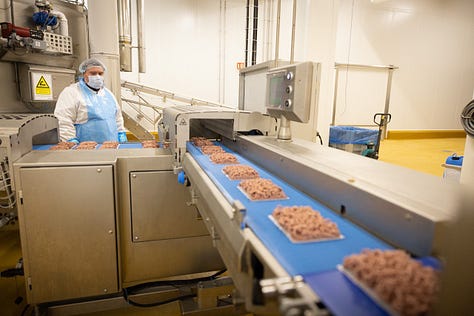
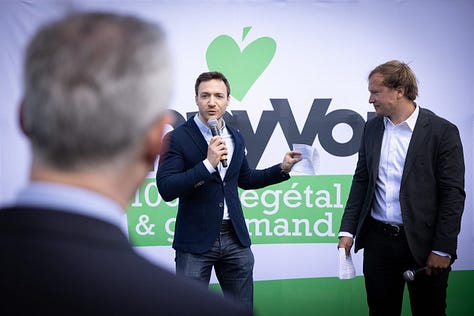
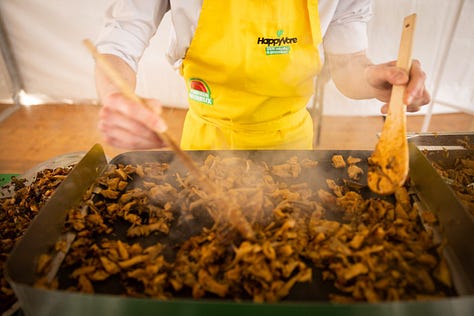
Ah, but flash forward to 2024, and it seems the Salad Days are over for France’s plant-based protein industry.
Last week, French regulators published a new rule that prohibits the producers of plant-based protein products such as HappyVore from using the meat equivalent names to label their products. So, no more vegetable steak, veggie bacon, or vegetable ham.
Why? Unfair competition! Even worse: Too confusing for consumers! Or, at least those have been the arguments from the livestock, pork, and poultry industries, who are displeased both with the specter of more competition, but also yet another movement that tags them as climate villains.
The alt-protein industry is flabbergasted for a couple of reasons. First, their products are pretty clearly marked "vegetable steak," or whatever. Second, the rules only apply to such foods made in France. If the alt-protein food is imported, it can still use the vegetable steak label.
“The fact that we, the companies that produce in France, are subject to the decree and not the others is unfair competition,” Unhappy HappyVore Co-Founder Cédric Mestron lamented to Les Echos.
A Political Love Triangle
In making the decision, the government found itself squeezed between two constituencies it courts heavily.
On one side of this political sandwich are the nation’s farmers. In case you have not heard, farmers are not in a happy place. Since late last year, farmers in this struggling sector have been staging big protests over what they see as unfair competition and a lack of government support. They have been trying to make their case on food labeling rules for years.
The Macron government has been trying to appease farmers by announcing billions of euros in new programs. An effort that has partially cooled temperatures, but not completely. Operation Seduce France’s Farmers is still a work in progress.
While the labeling rules had been in the works for a couple of years, the publication just happened to coincide with the annual Salon International de l'Agriculture, a massive event that gathers farmers and politicians wanting to kiss some agricultural butt. Prime Minister Gabriel Attal — who was appointed just as the farming protests boiled over — spent the week at the Salon petting cows, drinking artisanal beer, and furrowing his brows in an attempt to convince this audience that the government was doing all it could to address their problems.
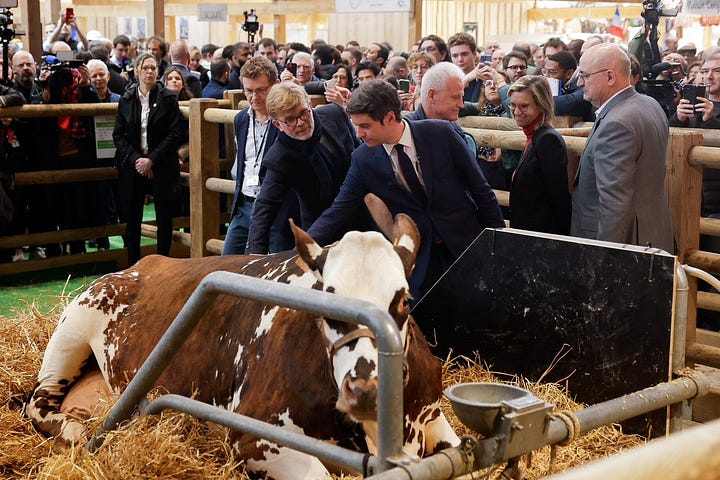
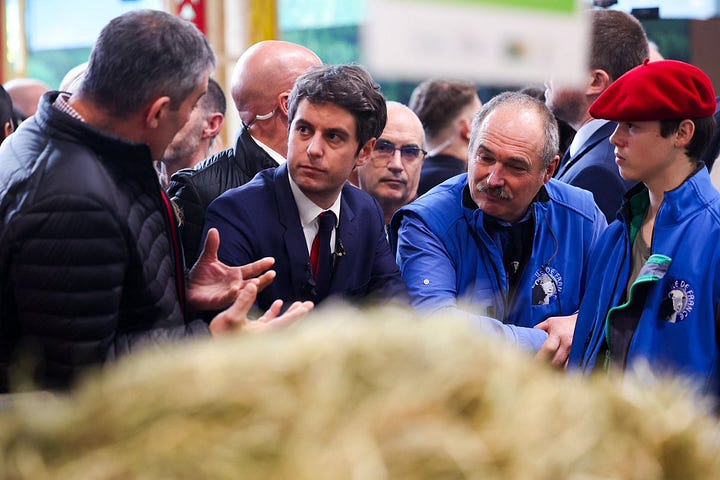
Regarding the new label rules, Attal kinda passed the buck:
"It was a request from our breeders: the decree banning the names steak, escalope, or ham for plant products was published today," he tweeted, somewhat halfheartedly with the undertone of the Gallic shrug.
High Steaks
The ambivalence is understandable, yet reflects a persistent problem Macron has had with balancing the demands of competing constituencies since taking office in 2017.
Of course, no politician can please everyone. But the essence of the Macron promise was that he was just the man for the job: Finding a way to support the urgent transformation needed to fight climate change and reinvent the nation’s economy for the future while also protecting those most vulnerable to the impact of these global changes.
For the past 7 years, Macron's government has been all about startups. During the pandemic, he doubled down with massive innovation programs, including a €54 billion France 2030 an innovation initiative designed to support projects that fight climate change and enhance the nation’s sovereignty. Innovative food checks both of those boxes neatly.
Companies in the FoodTech and AgTech sectors have received special attention. In France, there are at least 237 companies in the “innovative food” category, according to research firm Dealroom. These include companies that process insects to create new protein sources for animal feed, a company called Gourmey is developing lab-grown foie gras ($58 million in funding raised), new fermenting processes for dairy products, and seaweed farms for new generations of healthier nutrients. Dealroom says those companies have a collective value of $121 billion, with almost all of that being created since 2017.
Within that future food industry, there is a “meat substitute” sub-category that includes 13 companies with a total value of $1 billion. This includes HappyVore, Umiami ($68.3 million funding raised), La Vie ($29.2 million raised), and Hari & Co (acquired last year by the Avril Group).
The founders of these companies are furious about the labeling rules, and they’re not buying the explanation about consumer confusion.
“It’s taking consumers for idiots. The term plant-based is clearly indicated on the products. When I go to buy sunscreen, it’s not to make a quiche Lorraine,” Martin Habfast, the co-founder of Umiami, told Les Echos. Umiami makes plant-based meat and fish fillets that it sells to other food companies to make consumer products. The company operates a factory in Alsace.
Seeking to avoid criticizing farmers, these alt-protein companies have targeted their ire at the more amorphous “meat lobby.”
"This decree is completely out of step with the country's ambitions in terms of reindustrialization and the climate," said La Vie CEO and Co-Founder Nicolas Schweitzer in a statement. "Under the guise of transparency for consumers, this decision slows down the ecological transition and endangers a booming local industry. With its agricultural and culinary assets, France nevertheless has all the resources to become a key player in plant proteins."
During the Agriculture Salon, La Vie filmed a video mocking the idea that the labels confuse consumers:
Perhaps the best commentary, however, came from the satiric publication Le Gorafi, in an article with the headline: “After yet another dessert incident, the government also wants to ban the misleading name fruits de mer.” The term means “seafood,” but it literally translates as “fruits of the sea.” Would someone order baked goods with fruit only to find them stuffed with fish!!??
Le Gorafi explained the labeling decision was made by a fictional agricultural minister after he tried to light his cigar with allumettes de porc. This refers to small strips of pork, but allumette is the word for match. So confusing!
“If I was wrong, I think that many French people must be wrong every day,” he declared.
A coalition of food startups says it plans to appeal the rules, which take effect in 3 months and give the companies a year to sell off their stocks with the old labels. La Vie recounts its long legal and political battles here (in French).
…But Names Will Never Hurt Me
The alt-food industry has made progress, striking deals with major supermarket chains and partnerships with some farmers. Governments at the national and regional levels continue to offer support.
Still, it represents only 1% of the French food market. Even that standing is fragile. Inflation has already put it under pressure in terms of being cost-competitive. In the U.S., the much-hyped Beyond Meat is losing money and seeing demand slow, forcing it to lay off 8% of its workforce at the end of 2023.
Joking aside, for a young industry, such questions about labels can make a big difference. As Franceinfo noted recently:
A study published in August 2022 in the journal Food Policy tends to show that consumers have a better perception of imitation meat products when their name is inspired by meat. We also find here one of the basic rules of rhetoric: the lexicon influences our thinking. The words we name things by impact the way we think about those things. This is what we call the connotative dimension of discourse. Obtaining a victory in the lexicon is already gaining the upper hand in the political domain.
In this case, it seems the “meat lobby” understands that, and has pushed the right buttons.
They say a good compromise is when everyone is unhappy. In this case, the compromise the French government has tried to strike doesn’t protect traditional livestock farms from what they consider unfair competition. It could, however, undercut the government’s efforts to reinvent the national food chain.
So, everyone loses. It may be expedient, but it doesn’t seem like a recipe for a winning political strategy — or for solving the nation’s long-term economic and environmental challenges.
Chris O’Brien
Le Pecq



